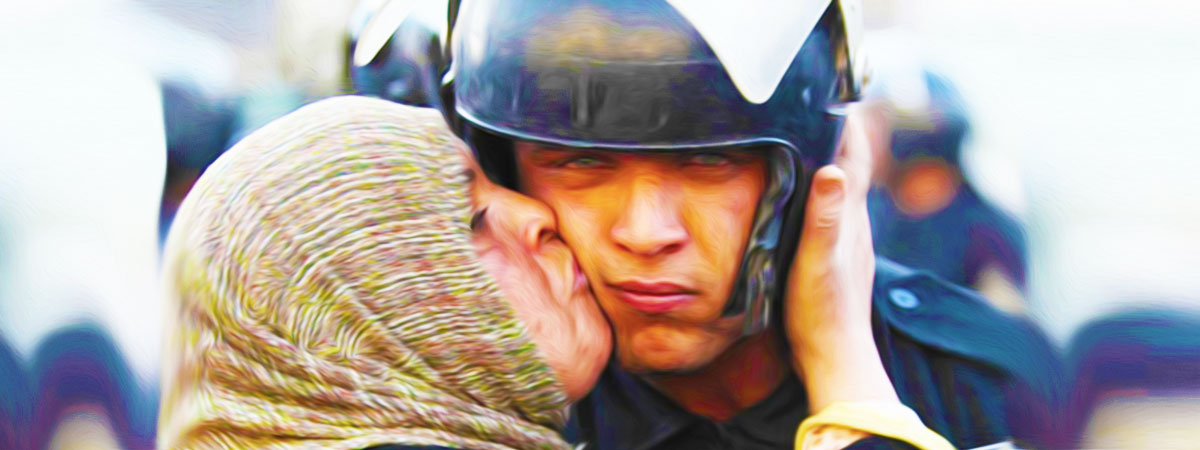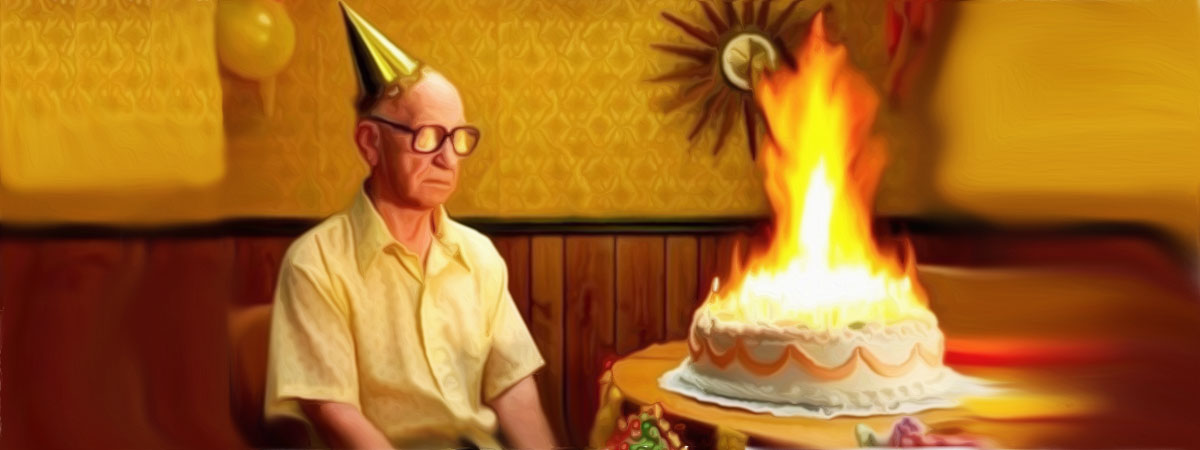Why Give a Damn:
This post tells the story of an Iraqi War veteran overcoming a murderous hatred of Muslims and a group of prisoners adopting local AIDS orphans in order to ask what we can learn from their stories in recovering from the Newtown Shootings.
The author of this post, Teju Ravilochan, is the CEO of the Unreasonable Institute.
The Newtown Shootings have prompted me to ask myself a lot of questions that I haven’t asked in quite some time. “What can I do?” This simply can’t happen again.
Politics be damned, we must have conversations about gun control. The Washington Post published a great post called 12 Facts about guns and mass shootings in the United States, further convincing me that we have to seriously revisit our 2nd amendment. We also need to have a conversation about mental health, and how we can strengthen the identification, support, and treatment of people facing mental health challenges.
But while we wait for the Obama Administration to announce its plan and for laws and policies to change, I struggle to come to terms with a chilling reality. In my heart, I want to find a way to ensure that this will never ever ever happen again. But at the same time, I know that it will happen again. It is the 19th mass shooting in the past five years, and in the 13 days since Sandy, guns have claimed more than 100 American lives.
So what are we to do while we wait for the government to take action? How are we supposed to feel? How do we take something—anything—away from this horrific tragedy so that we can grow and advance as a nation, if for no other reason than to honor the 27 lives lost in Sandy Hook?
I want to answer these questions so badly. But all I have is more questions: what kind of a person does this? Who was Adam Lanza? What kind of pain must he have been in, to have acted as he did? How could he possibly have been someone who felt loved and cared for and valued? How could he possibly have felt a sense of belonging to the community around him? And what if he had? Could this tragedy have been avoided?
As I ask these questions, I think that it’s rarely the person who feels safe, loved, and valued who intentionally hurts others. It’s the person who feels threatened and insecure who does—in small ways, on a day-to-day basis, and on days like December 14th, in big ways.
So what I keep coming back to is a belief I have formed since the Aurora shooting on July 24th of this year: perhaps the major source of pain and suffering in our world is disconnection. Poverty is a form of disconnection from economic opportunity, oppression is a form of disconnection from political voice, and violence may often be a symptom of disconnection from love and belonging (as discussed by this WHO study called Violence Prevention: The Evidence). If we want to address disconnection in our society in its various manifestations, our answer cannot rely on further disconnection. It requires us to find ways to connect the disconnected.
Today, I offer two stories that I believe illustrate this point: about an Iraq War veteran with a murderous hatred for Muslims and about a group of maximum-security prisoners in South Africa. In both tales, those feeling the pain of disconnection find that connection serves them much better than further disconnecting.
How an Iraq War Vet Extinguished His Hatred of Muslims
In a 2007 episode of the NPR program, This American Life, Lisa Pollak tells the story of Sam Slaven, a former US Army sergeant who faced his hatred for Muslims head on.
In May 2003, Sam joins the US Army. He is dispatched to Iraq at the start of the war and is keen to help the local people, who welcome him warmly, offering him tea and cake and treating him like a friend.
That changes on October 9th, 2003, when his platoon goes out on a routine patrol. They see a woman and child who appear to be hurt calling for help. Going to their aid, the platoon is immediately attacked by insurgents. It’s a trap. IEDs are detonated, shots are exchanged, and two men from Sam’s platoon are killed.
Sam and his platoon feel betrayed by the local community, who must have known that the attack was being planned. And as more and more skirmishes with insurgents occur, Sam can hardly contain his seething distrust of Iraqis, which steadily morphs into an urge to kill any Iraqi he sees.
Months later, Sam’s stint in Iraq comes to an end. Now experiencing symptoms of PTSD, he leaves the army, begins to see a therapist, and starts taking classes at Parkland College in Indiana in May 2006. But despite having left Iraq, his hatred of Muslims festers. He passes by mosques, fearful that the Muslims inside will break out with guns and try to kill him.
One day, he walks by a Middle Eastern looking man with a long beard. Feeling “an instantaneous rush of anxiety and adrenaline,” Sam thinks about choking him out – of killing him then and there. But he snaps back to reality and reminds himself, “This isn’t a war zone. I’m not armed. I’m not a killer.” Realizing he never had such thoughts before joining the army, he asks himself, “What have I become? What can I do to get back to the way that I was?” As he faces his own murderous thoughts, he sees a poster on bulletin board saying “Learn about Islam. Join the Muslim Student Association. Meets on Thursdays.”
So, the next Thursday, Sam goes to his first Muslim Student Association (MSA) meeting.
When he arrives, the Muslim students regard him with suspicion. They ask him what he’s doing at the MSA. He explains, honestly, that he is coming for therapy—that he was an Iraq War veteran and that he’s looking to change his views about Muslims.
While most of the students think he might be a spy, this is exactly the kind of opportunity that Muslim Student Association founder Yousef Radiff has hoped for since he began the organization. Yousef, originally from Iraq himself, wants the MSA to be a place for dialogue between Muslims and non-Muslims that can dispel the image of Islam as violent and fundamental. He begins spending a lot of time with him. Over the course of many MSA meetings, Sam asks Yousef questions about things he’s heard about Islam—about jihad and “killing infidels.” Yousef explains this isn’t what Islam is about, and that most Muslims don’t support “killing infidels” or suicide bombings.
As the year wears on, Sam becomes one of the MSA’s most dedicated members, tabling for the organization on campus, organizing a 5K run to stand against the negative perception of Islam. The initial suspicions that Muslim students had of him vanish. And he develops a fast friendship with Yousef. They start going out to meals. Yousef comes over to help him fix his roof, while Sam begins to teach Yousef magic tricks he knows. One day, Sam gets into a car with Yousef and says, “This is the first time I’ve ever been in a car with an Iraqi without a gun.”
Through building this connection with Yousef and with the MSA, Sam overcomes his hatred toward Muslims and his PTSD.
Lisa Pollak concludes by saying: “It was only by the sheer force of will that Sam went to the Muslim Student Association. And then he had to meet someone like Yousef, to welcome him, who was willing to overlook what he had done in the past. No wonder this happens so rarely.”
People like Sam and Yousef are rare. Sam finds the courage to be vulnerable by going to MSA and Yousef creates a safe space for Sam. Through their conversations and eventual friendship, Sam finds himself accepted by the Muslim community and Yousef makes progress in earning the acceptance of Parkland College’s non-Muslim community. Both had every opportunity to turn and run away, but they chose to find connection when connection was hard. It’s this kind of story that I look to for inspiration as to how we treat one another and build communities that pull people in from the fringes.
To have the self-awareness and openness of Sam and Yousef is remarkable, but, I wonder, does it have to be? Can it be taught? And can it be scaled on a community level and perhaps even on a policy level? My friend and 2012 Unreasonable Fellow Robyn Scott told me the following story, which makes me believe it might be possible.
How a group of prisoners adopted local AIDS orphans.
Robyn Scott is writing a book called Big Like Coca Cola about a group of inmates she’s been visiting at a maximum-security prison in South Africa, which she explains in the excellent TED Talk below.
Nearly all these inmates are imprisoned for the murder or manslaughter of children, women, or political figures. And yet, with the support and regulation of the prison guards, they began an initiative to host monthly parties for AIDS orphans. As they get to know these orphans and connect with them, they start making paper jewelry they can sell for money to pay for the children’s school fees and medications.
These murderous men, who most of us would be terrified to let near our own children, become adoptive fathers to these orphans. Robyn describes an image at the prison she’ll never forget: these toddlers running toward the 12-foot fence surrounding the prison, grabbing it, and shouting in excitement about getting in to see their “fathers.”
While some criminals may be beyond treatment, I wonder if “justice” is better served not by isolating criminals from society and surrounding them with other criminals, but instead, under safe circumstances, by giving them opportunities to reconnect—opportunities to feel love and belonging. The men in this South African prison are reminded of what it feels like to be depended on, to be valuable, to feel loved, and to feel worthy of this love from their adopted children. And AIDS orphans experience the feeling of having loving fathers once again.
So what?
As I think about a world where Newtown shootings are a reality, I think that now, more than ever, is an opportunity to reflect on how we design community and overcome the forces that disconnect us from others—be they small judgments or murderous proclivities. While not a panacea, the stories of Sam Slaven and these imprisoned criminals show us just how much human connection can overcome.
Photo Credit: The Atlantic



